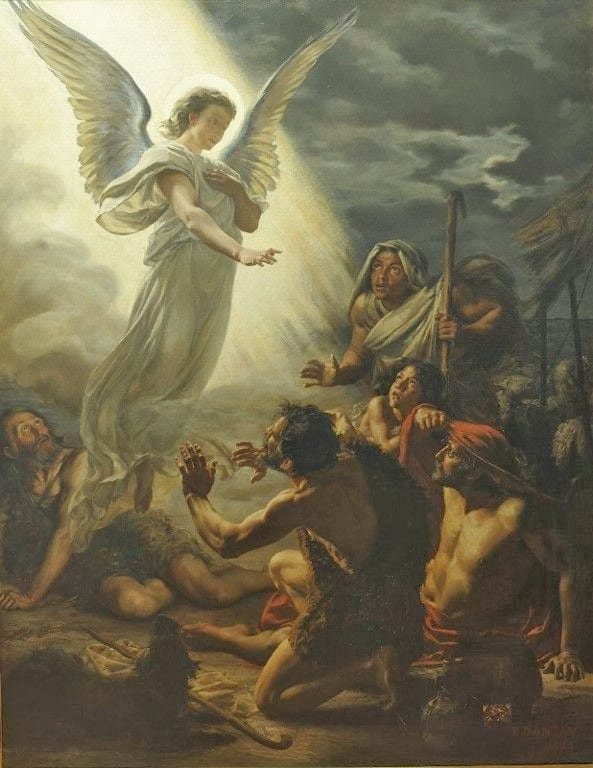Martin Luther famously observed that the words “for you” are the most important words in the Sacrament of the Altar. It isn’t just that the body and blood of Christ are present in the bread and wine, as crucial as that is. But “This is my body” and “This is my blood” would just be an interesting objective phenomenon if it weren’t for the next words “Given and shed for you for the forgiveness of sins.” That this miracle is “for you” makes it the Gospel.
Similarly, the Swedish Lutheran bishop and novelist Bo Giertz points out that the Nativity accounts in the New Testament say that the events being described are “for you.” The birth of Christ is not just an important and mind-blowing historical event, though it certainly is that. But Christ’s birth is “for you.” That is, it is Gospel.
In the devotional collection of his sermons, A Year of Grace (translated by long-time reader and commenter at this blog, Bror Erickson), Bishop Giertz preaches on the angel’s words to the shepherds (my bolds):
Fear not, for behold, I bring you good news of great joy that will be for all the people. For unto you is born this day in the city of David a Savior, who is Christ the Lord. And this will be a sign for you: you will find a baby wrapped in swaddling cloths and lying in a manger.” (Luke 2:10-12)
Notice how many “you’s” are in this passage! Three in four sentences, plus a similarly all-inclusive “for all the people”!
Bishop Giertz sees this address to the shepherds in the larger context of the New Testament proclamation of the Gospel, as in Peter’s Pentecost sermon: “The promise is for you” (Acts 2:39). I would add, not just “you” the immediate hearers, but, to quote the rest of the verse, “For the promise is for you and for your children and for all who are far off, everyone whom the Lord our God calls to himself.” That is, those of us who will live in a “far off” time; including you and me.
Bishop Giertz says,
“The promise is for you.” When the gospel comes to us it does not come as just a story about something that has happened or about something that has the same unchangeable application in all times. No, it is a message that applies to us, and it applies right now. It is a greeting from God, an invitation. The promise is for you.
And this also means the Christmas gospel. It is not just a story about something that has happened and had important consequences for the world. There also lies in this story a greeting and a message for us, a greeting that gives understanding and a tiding that is full of meaning for those able to hear it.
We can listen to it word for word just as the angels on Christmas night carried it.
He then focuses on the specific words in the angel’s proclamation: “I bring you good news of great joy” (Luke 2:10). Bishop Giertz emphasizes that this personally-directed message is “news”:
It wasn’t an old, well-known truth to them. It was news. Something had happened. God sent a greeting to them. God cared about them. God wanted to help them. In the midst of the dark and the cold, during their hard and heavy work, in the midst of all the burdens life had put on them, God came so close to them, so nearly and did so much in order for them to understand it. It really was good news.
“For unto you is born this day in the city of David a Savior” (Luke 2:11):
Unto you a Savior has been born. He is born to others, but they don’t mean anything here. Had you been the only one who needed help, then He still would have become man and descended to you. For your sake, He is born, for your sake He has lived, and for your sake He has died and been resurrected. It is He who is now the bond so that you may be children of God. All your sins count for nothing. They are atoned for by Him.
“And this will be a sign for you: you will find a baby wrapped in swaddling cloths and lying in a manger” (Luke 2:12):
One might think that the hymns of angels and heavenly glory would have been a better sign. But no, instead, it was this newborn child that meant so much more than all the heavenly visions and glorious revelations. For here was God. In Him lived the fullness of God bodily, in this little body of a boy. This is the great mystery of God, His way of helping us. God became man. He entered our world. Here He lived, here He suffered. Here He remained, for here He established His church where He would always be with us. He is in these signs He has given us: the water of baptism, the word that is proclaimed, the bread and wine of Holy Communion. . . .
And this same “you” applies today to all those who want to find God, all those who are in distress of some sort and would like to believe that there is a Savior even for them. This shall be for you a sign. God is here, the same as then. He has descended to earth. god Himself slept that night on straw. The heaven’s blessing lay swaddled and in a crib. Thus has God taken His dwelling in the most insignificant of insignificants when He chose the means of grace through which the child Jesus and the crucified Savior would come to us today. There Christ hides in a word that can be read and heard–and mocked and scoffed and opposed if one wants to do so. Here He rests on the altar, mysteriously contained in the cup and the wafers. Here the sign has already touched you and was put upon your forehead when you were baptized. This is now the sign that can make a man certain. It is the means that creates faith.
So all the imagery of Christmas–the baby, the swaddling clothes, the manger–is a “sign for you.” Christmas itself is “for you.”
To all my readers, I wish you a blessed Christmas with all that it means!
As is the custom at this blog, next week we will take a look back at this exceedingly strange year, culminating on New Year’s Eve with our annual check of our predictions! If anyone predicted the coronavirus, he or she will not only win the contest, but we will name the contest after them in perpetuity! And then, on New Year’s Day, we will all make our predictions for the year to come, which, in turn, will be checked this time next year. So be thinking about what will be in store for 2021. The following week, building up to Epiphany, we will have some posts that will similarly look ahead. May your 2021 be better than your 2020!
HT: Jackie
Illustration: “Annunciation to the Shepherds” by Édouard Joseph Dantan (1875), CC BY-SA 4.0 <https://creativecommons.org/licenses/by-sa/4.0>, via Wikimedia Commons













